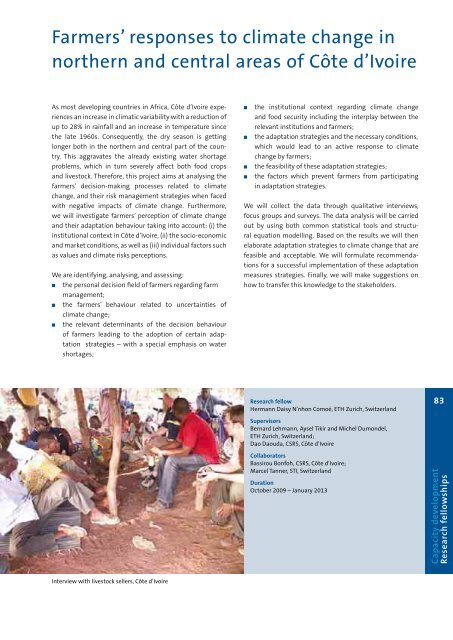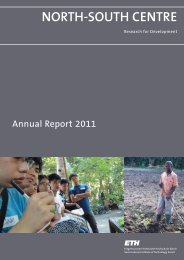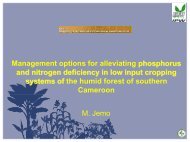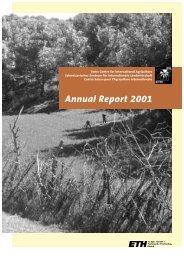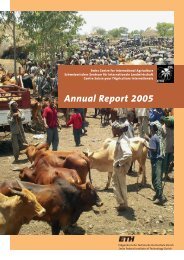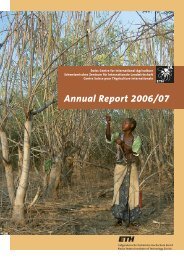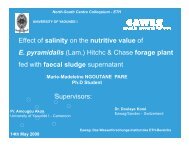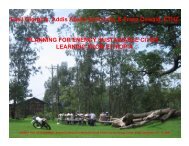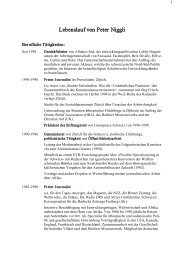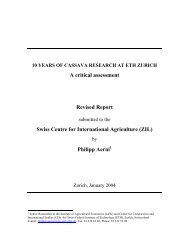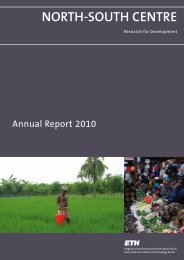NORTH-SOUTH CENTRE - ETH - North-South Centre North-South ...
NORTH-SOUTH CENTRE - ETH - North-South Centre North-South ...
NORTH-SOUTH CENTRE - ETH - North-South Centre North-South ...
Create successful ePaper yourself
Turn your PDF publications into a flip-book with our unique Google optimized e-Paper software.
Farmers’ responses to climate change in<br />
northern and central areas of Côte d’Ivoire<br />
As most developing countries in Africa, Côte d’Ivoire experiences<br />
an increase in climatic variability with a reduction of<br />
up to 28% in rainfall and an increase in temperature since<br />
the late 1960s. Consequently, the dry season is getting<br />
longer both in the northern and central part of the country.<br />
This aggravates the already existing water shortage<br />
problems, which in turn severely affect both food crops<br />
and livestock. Therefore, this project aims at analysing the<br />
farmers’ decision-making processes related to climate<br />
change, and their risk management strategies when faced<br />
with negative impacts of climate change. Furthermore,<br />
we will investigate farmers’ perception of climate change<br />
and their adaptation behaviour taking into account: (i) the<br />
institutional context in Côte d‘Ivoire, (ii) the socio-economic<br />
and market conditions, as well as (iii) individual factors such<br />
as values and climate risks perceptions.<br />
We are identifying, analysing, and assessing:<br />
the personal decision field of farmers regarding farm<br />
management;<br />
the farmers’ behaviour related to uncertainties of<br />
climate change;<br />
the relevant determinants of the decision behaviour<br />
of farmers leading to the adoption of certain adaptation<br />
strategies – with a special emphasis on water<br />
shortages;<br />
<br />
<br />
<br />
<br />
the institutional context regarding climate change<br />
and food security including the interplay between the<br />
relevant institutions and farmers;<br />
the adaptation strategies and the necessary conditions,<br />
which would lead to an active response to climate<br />
change by farmers;<br />
the feasibility of these adaptation strategies;<br />
the factors which prevent farmers from participating<br />
in adaptation strategies.<br />
We will collect the data through qualitative interviews,<br />
focus groups and surveys. The data analysis will be carried<br />
out by using both common statistical tools and structural<br />
equation modelling. Based on the results we will then<br />
elaborate adaptation strategies to climate change that are<br />
feasible and acceptable. We will formulate recommendations<br />
for a successful implementation of these adaptation<br />
measures strategies. Finally, we will make suggestions on<br />
how to transfer this knowledge to the stakeholders.<br />
Research fellow<br />
Hermann Daisy N’nhon Comoé, <strong>ETH</strong> Zurich, Switzerland<br />
83<br />
Supervisors<br />
Bernard Lehmann, Aysel Tikir and Michel Dumondel,<br />
<strong>ETH</strong> Zurich, Switzerland;<br />
Dao Daouda, CSRS, Côte d’Ivoire<br />
Collaborators<br />
Bassirou Bonfoh, CSRS, Côte d’Ivoire;<br />
Marcel Tanner, STI, Switzerland<br />
Duration<br />
October 2009 – January 2013<br />
Capacity development<br />
Research fellowships<br />
Interview with livestock sellers, Côte d’Ivoire


